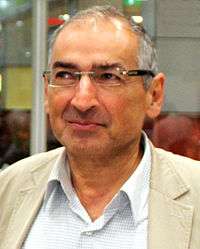Sadegh Zibakalam
| Sadegh Zibakalam | |
|---|---|
|
Zibakalam at Bushehr Airport, 2013 | |
| Born |
Sadegh Zibakalam Mofrad 12 June 1948 Tehran, Iran |
| Residence | Sa'adat Abad, Tehran[1] |
| Nationality | Iranian |
| Fields | Political Science |
| Institutions |
University of Tehran Islamic Azad University |
| Alma mater | University of Bradford |
| Thesis | The Historical Genesis of the Islamic Revolution (1989) |
| Doctoral advisor | Thomas Gerard Gallagher |
| Notable students |
Saeed Hajjarian[2] Fatemeh Hashemi Rafsanjani[2] |
| Influences | Ghazali[3] |
|
Website www | |
Sadegh Zibakalam (Persian: صادق زیباکلام, lit. 'honest eloquent-speaker';[4] born 12 June 1948) is an Iranian academic, author and pundit[5] described as reformist[6] and neo-liberal.[7]
A graduate of the University of Bradford,[8] he is a professor at University of Tehran[9] and appears frequently on international news outlets[10] including the BBC and Aljazeera.
His books "How Did We Become What We Are?" and "An Introduction to Islamic Revolution" are among bestsellers and prominent books on Iranian contemporary politics.[2]
Zibakalam has become a familiar face in Iran for his passionate and daring debates with hardliners in which he publicly challenges the state line on many sensitive topics.[4]
2000 Parliament election disqualification
While teaching at Islamic Azad University of Zanjan, Zibakalam registered as a candidate for the Iranian legislative election, 2000 from Zanjan, but he was disqualified by the Guardian council.[2]
Views
In January 2014, he wrote an open letter to Hassan Rouhani and criticized him for not focusing on his campaign promises including freeing political prisoners and ending house arrest of the 2009 presidential candidates (Mir-Hossein Mousavi, Zahra Rahnavard, and Mehdi Karroubi). This was in reaction to a recent Ruhani's speech in praise of pro-government protests against Green Movement protests on Ashura of 2009.[11]
Zibakalam has questioned achievements of nuclear program of Iran and for this he has been charged with "weakening the system".[12][13] In February 2014, Zibakalam publicly stated that he recognizes the State of Israel because the United Nations recognises it as a state.[4]
References
- ↑ صادق زیباکلام اینگونه شیفته آیتالله هاشمی شد (in Persian), namehnews.ir, retrieved 24 March 2015
- 1 2 3 4 مردی که زیاد می داند (in Persian), tourjan.com, retrieved 24 April 2015
- ↑ مناظره خواندنی زیباکلام و خسروپناه در باره نقش دین و عقل در زندگی انسان (in Persian), Khabar Online, retrieved 24 March 2015
- 1 2 3 "The Iranian professor who dares to differ on nuclear matters and Israel". The Guardian. 8 April 2015. Retrieved 9 April 2015.
- ↑ Hanif Zarrabi-Kashani (19 December 2014). "Iranian Press Week in Review". The Brookings Institution. Retrieved 21 June 2016.
- ↑ Mehrun Etebari (10 May 2013). "Iran Press Report: Waiting for Rafsanjani". The Brookings Institution. Retrieved 21 June 2016.
- ↑ Stephanie Cronin (2013). Reformers and Revolutionaries in Modern Iran: New Perspectives on the Iranian Left. Routledge/BIPS Persian Studies Series. Routledge. p. 43. ISBN 1134328907.
- ↑ Bradford link stirred PM to press Shah to free academic detainee | General | Times Higher Education
- ↑ Iran's regional aspirations face realities at non-aligned nations summit | The Times of Israel
- ↑ This House believes that Iran poses the greatest threat to security in the region | Series 2 | The Doha Debates
- ↑ Karami, Arash (3 January 2014). "Rouhani criticized by supporter for statement on 2009 elections". AL-MONITOR. Retrieved 3 January 2014.
- ↑ "Dismantling the wall - Hassan Rohani has changed the mood in Iran. But he faces opposition". The Economist Newspaper. 22 February 2014. Retrieved 21 February 2014.
- ↑ Ghazi, Fereshteh (6 February 2014). "Is it a Crime to Not Defend the Nuclear Program?". Rooz online. Retrieved 21 February 2014.
External links
| Wikimedia Commons has media related to Sadegh Zibakalam. |
